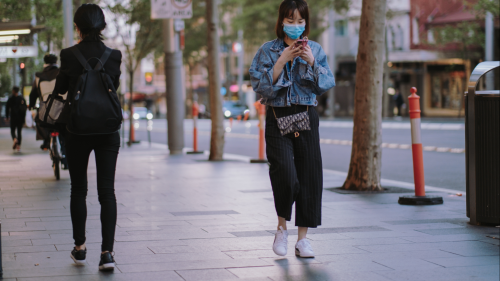With Normalcy Returning in Some Places, Global Public Opinion Shows a Degree of Anxiety

While coronavirus restrictions are being incrementally removed in certain countries, some people are feeling concern at returning to the activities that had characterized their pre-pandemic lives.
This week the world passed the 167.8 million case mark, with over 3.4 million deaths attributed to COVID-19. The global public has mixed feelings about moving toward a conclusion to the pandemic. While optimism and hope are rife, so too is anxiety about simple facets of life such as going to public places or shaking someone’s hand.
For this week’s COVID-19 update, the Chicago Council Survey team looks at polling results from the United States, Japan, South Korea, France, and the United Kingdom.
Key Findings
- In the United States, just eight percent say a return to normal life represents a large risk to their health and well-being; most Americans see doing so as a small risk (40%) or no risk at all (21%).
- A third of the Japanese public says the Olympics should go on, but four in ten (40%) say they should be canceled, while a quarter (23%) favors a second postponement.
- In France, even as reopening measures have begun, French people are split on its prospects for success, with 59 percent expecting it to succeed and 40 percent expecting it to fail.
- In Britain, the intention to be vaccinated is extremely high (94% either intend to or already have taken it) and optimism for the United Kingdom is on the rise (41%).
The United States
33.1 million cases, 590,628 deaths
The country’s reopening and return to normal continues apace. Half of Americans over the age of 18 (50%) are now fully vaccinated, and another 12 percent have received their first shot. With progress on vaccines, the CDC has updated its public health guidelines around masking and social-distancing, stating that vaccinated individuals do not need to wear masks in most day-to-day activities. Though there was certainly debate over the guidelines, most Americans have at least heard of the CDC’s revised masking and social-distancing guidelines for vaccinated people, with most very (40%) or somewhat familiar (42%) with the updates, and of those, seven In ten (69%) say the guidelines are very or somewhat clear.
This revised guidance comes at a time of changing public behaviors. Less than half of Americans report having worn a mask outside the home at all times in the last week (45%) or socially distancing in the past week (44%). At the same time, the proportion of Americans who have gone out to eat in the last week (58%) has hit a level not seen since the very first Axios/Ipsos coronavirus trend survey in March 2020 (when it was 56%). The perceived risk of returning to normal life is at its lowest point yet, with only eight percent saying it represents a large risk to their health and well-being; most Americans see doing so as a small risk (40%) or no risk at all (21%).

With more and more Americans vaccinated, and as cities and states lift pandemic restrictions, Americans are also planning to travel again. A third of Americans (34%) say they’ve already made summer plans of some sort, but even more are planning to take a trip soon. Six in ten (58%) say they plan to take a road trip in the next six months, and half (51%) plan to visit a city—with nearly as many (48%) planning to stay in a hotel.
But travel means encountering people outside one’s own social circle, and Americans don’t fully trust others to be truthful about their vaccination status. While Americans trust their family and friends (88%) and coworkers (71%), most Americans don’t trust people they don’t know well to be truthful (38% trust, 60% do not). Nor does the public trust people they might encounter in other places, such as airports (75% distrust) and outdoor concerts (74% distrust).
Vaccination status is also a topic of conversation for friends and family; six in ten (61%) say they’ve asked close friends about their vaccination, and a similar proportion (60%) say they’ve been asked by people about their own vaccination status. But most people’s employers have not asked about vaccinations (28% have, 72% have not), and very few (5%) say their employer has required them to be vaccinated.
Japan
726,535 cases, 12,456 deaths
With the opening of the Tokyo Olympic and Paralympic Games less than two months away, Japan continues to struggle to contain the pandemic. The public’s evaluations of the government’s COVID-19 response have risen and fallen over the last year as waves of infection have come and gone. This most recent wave of infections, however, has disapproval of the government’s response at a high point. Asahi Shimbun polling conducted May 15-16 finds that two-thirds of Japanese (67%) give the government negative marks for its coronavirus response.
They may in part be unsatisfied with the stringency of the available countermeasures: though major cities in Japan remain under a state of emergency, that’s hardly a UK-style lockdown, or a French-style confinement. As we’ve mentioned before in these roundups, Japan’s ‘state of emergency’ is far less restrictive than most other countries have implemented to contain the spread of COVID-19. Perhaps as a result, a majority of Japanese (59%) say the state of emergency is ineffective in containing the spread of the pandemic (49% not very effective, 10% not effective at all). The public also wants what measures are available applied more broadly. In Mainichi polling, only two in ten (20%) say the existing state of emergency is appropriate; a majority (59%) want a nationwide declaration of emergency.
Prime Minister Suga is taking the brunt of the political toll. His approval ratings have been net negative since April, and six in ten (61%) say they do not have trust in Suga’s anti-COVID policies. His political future is also in jeopardy. In the most recent Mainichi Shimbun/SSRC poll, four in ten Japanese (40%) say he should step down before his term is up, and few (13%) say he should continue as long as possible. The plurality of the public (47%) want him to serve his term—but there seems to be little support for him staying on as Prime Minister beyond that.
Suga may be hoping that the combination of vaccinations and the Olympics give him a summertime boost in popularity. But both pose problems.
First, holding the Olympics during a pandemic is not proving to be a popular move. A third of the public says the Games should go on, but four in ten (40%) say they should be canceled, while a quarter (23%) favors a second postponement. The issue: most Japanese (71%) don’t believe that the Olympics and the country’s anti-pandemic efforts are compatible, and favor prioritizing health measures rather than the Olympics.
Second, while vaccinations are now underway in Japan, the country’s vaccination rate lags behind other major countries, such as France, the UK, and the United States. Two-thirds of Japanese (66%) say the government is largely responsible for that delay. On the bright side, Japan is vaccinating quickly, aided by mass vaccination sites. And as the vaccination campaign continues, more Japanese say they want to get vaccinated immediately: 47 percent in Asahi polling, 63 percent in Mainichi polling conducted the following week.
South Korea
136,983 cases, 1,938 deaths
Daily infection counts continue to hover around the 600 mark in South Korea. On May 27, it recorded 629 new cases. COVID-19 variants are also being detected more often among confirmed cases. In efforts to lower the numbers and speed up vaccine rollout, the government has extended current social distancing measures for three weeks and will be conducting clinical trials that mix-and-match vaccines.
Even though Korea has yet to confirm blood clot cases, people are on the fence about taking their shots. According to a May 7-9 survey by the Korea Broadcasting System and Seoul National University, the percentage of those willing to get vaccinated decreased to 59 percent—down from 66 percent in March and April. Moreover, distrust levels toward the government increased from 37 percent in April to 50 percent.
As a response to public petitions asking for government measures on worrisome vaccine side effects, the Korea Disease Control and Prevention Agency (KDCA) Commissioner Jeong Eun-kyeong stressed that vaccinations are the only way to return to normal life and that medical expense coverage will be expanded for those who experience side effects even if there are unclear causal links. In the private sector, major firms like Samsung and LG are giving employees paid leave after they get their vaccinations—a decision in line with government recommendations. However, small- and medium-sized enterprises are expressing concerns that they are less able to bear the related expenses compared to conglomerates.
Meanwhile, following the Biden-Moon summit, the two countries have agreed on a vaccine partnership. Samsung Biologics will manufacture Moderna vaccines and South Korean troops will receive Johnson & Johnson vaccines. A recent May 18-20 survey by Gallup Korea shows that public approval of the government's COVID-19 response has risen from 43 percent in April—the lowest number since February 2020—to 50 percent.
After a temporary suspension due to lack of supply, first dose appointments have now resumed. To encourage the public to get their shots, the government has announced that they plan on easing social distancing after completing vaccinations for the elderly in June. The ruling party is also looking into various incentives for those fully vaccinated such as exemptions from self-quarantine.
France
5.6 million, 109,040 deaths
As cases dip to lows not seen since last summer, France has begun its ‘deconfinement’ process to shed the restrictive measures which have led to this decrease in cases. As of May 19, the curfew has been pushed back to 9pm, restaurant terraces are open at 50 percent capacity, and businesses and museums have reopened with certain restrictions, among other changes. French people can look forward to the next stage of deconfinement on June 9, at which point some of the restrictions for restaurants and public spaces will be removed, and the curfew will be pushed back further.
Even as the trappings of normalcy return to France, there appears to be a degree of skepticism at the prospect of exiting the pandemic. A May 20-21 Odoxa poll found that while 59 percent of French people believe that France will succeed in its deconfinement, 40 percent do not believe it will succeed. Moreover, a majority (55%) do not think that France is in the process of durably exiting the pandemic. Though this wariness is undoubtedly the result of multiple waves of the virus, the growing vaccination campaigns and diminishing cases suggest that this time may actually be different.
Despite the doubts, there is optimism around France’s vaccination campaign. After President Emmanuel Macron declared in February that everyone who wants a vaccine will be able to get one by the end of the summer, discussions have arisen over whether this is a realistic goal. Three months later, French people are leaning toward believing the president’s claims: 59 percent say they think this promise will either certainly (13%) or probably (46%) be held.
Perhaps as a result, Macron’s approval rating has improved this month, with 41 percent expressing support, up from 38 percent last month. Though 58 percent continue to disapprove of the president, his favorability has been slowly yet steadily increasing for the past two and a half years. With the pandemic seemingly winding down, a successful conclusion to his term could have significant implications for the 2022 French presidential elections.
The United Kingdom
4.4 million cases, 127,739 deaths
While the United Kingdom is seeing fewer cases and deaths and the nation’s reopening measures have begun, the pandemic continues around it. This past Sunday, May 23, Germany banned a significant amount of flights from the United Kingdom citing concerns over the new ‘India variant.’ This decision follows the UK government’s publication of data showing that there were over 2,000 new cases of this variant from May 12 to May 19: a significantly higher number than any other variant in that time period. Although the situation in the United Kingdom remains stable, the increasing numbers of this variant may portend a downturn in the nation’s public health situation.
For Britons, however, their eyes are on the conclusion of the pandemic. An April 29-May 5 Ipsos MORI poll showed that 94 percent of Britons intend to take, or have already taken, the vaccine, and economic optimism in Britain is at its highest point in 6 years, according to a May 21 Ipsos poll. Along with this economic optimism, there is a growing comfort with making a major purchase (42%, up from 34% in January 2021). Moreover, Britons are feeling optimistic about the United Kingdom (41% optimistic, 32% pessimistic), their local areas (46% optimistic, 18% pessimistic), and themselves and their families (62% optimistic, 11% pessimistic).
Despite these positive feelings, there is also a certain anxiety about the prospect of returning to normal. Asked how comfortable they would feel doing certain things as they did before the pandemic, minorities of Britons say that they would be uncomfortable going to bars and restaurants (31%, 59% comfortable), visiting an indoor museum (23%, 62% comfortable), or having people work in their home like maids or nannies (23%, 61% uncomfortable). But even more are uncomfortable with shaking hands (40%), going to large public gatherings like concerts or sports games (45%), or taking holidays abroad (50%).
British people have the sense that things are improving and are looking forward to a return to normal, though many feel overwhelmed at the idea of returning to how things were before. However, neither Britain nor the world are out of the woods yet, and with new variants beginning to circulate, it may be too soon to declare that the pandemic is over, especially for Britons.





